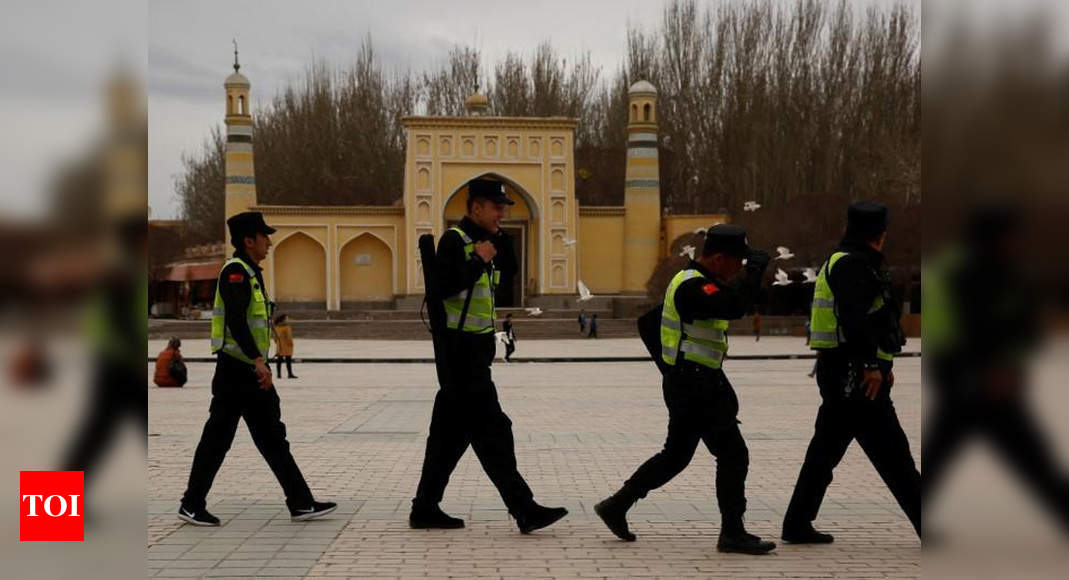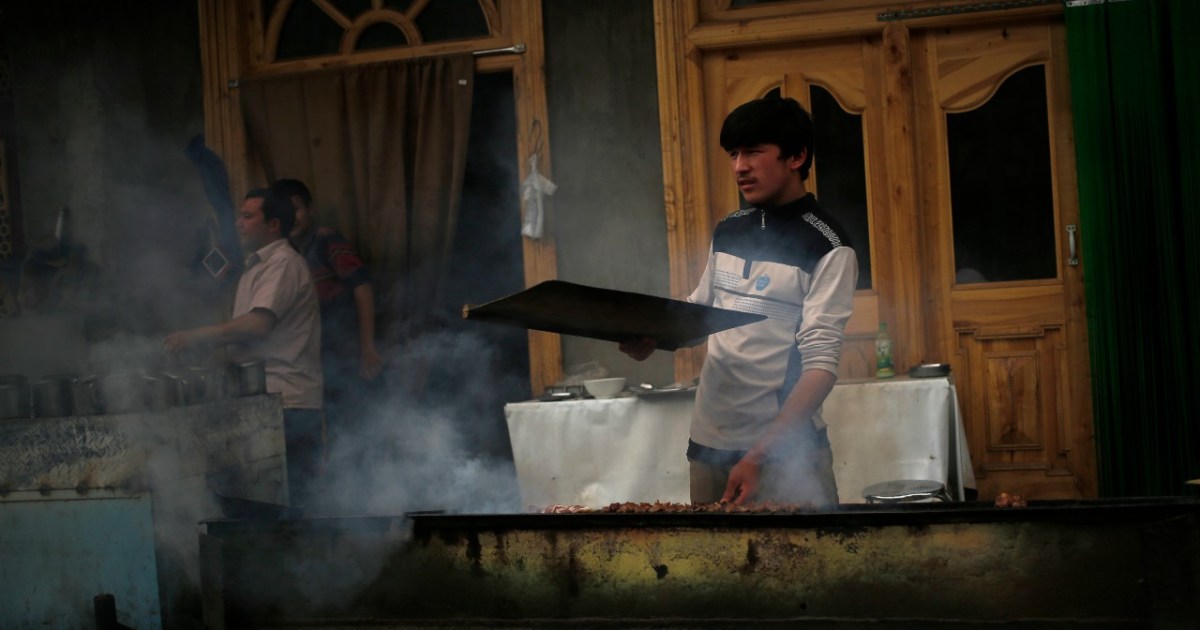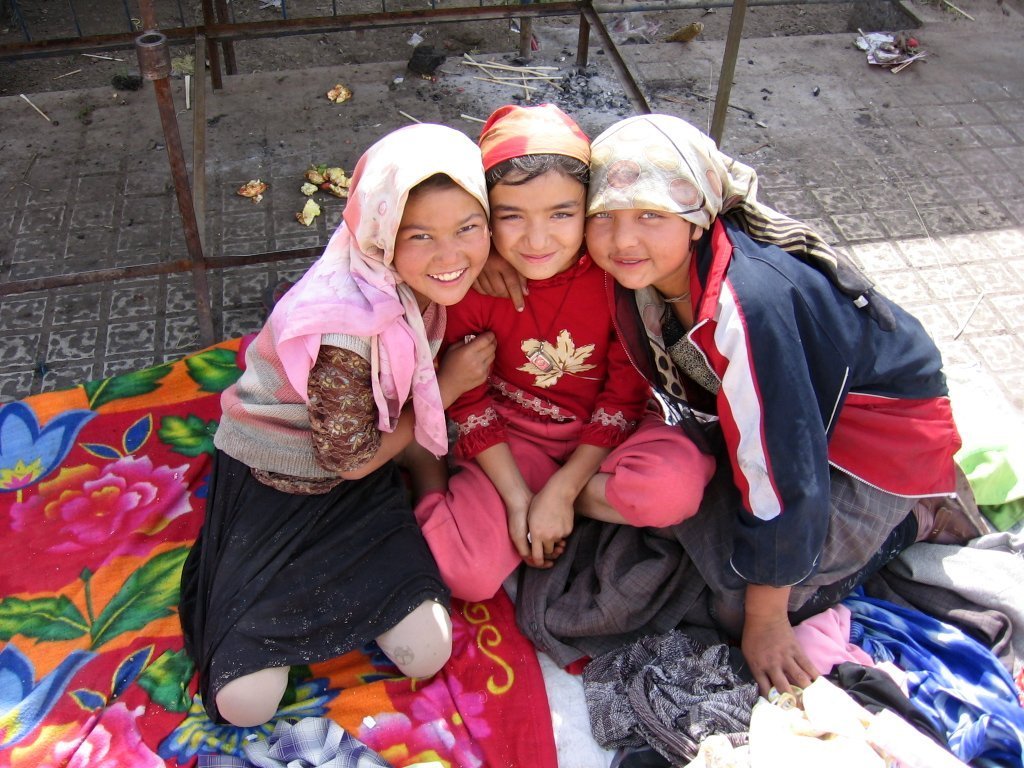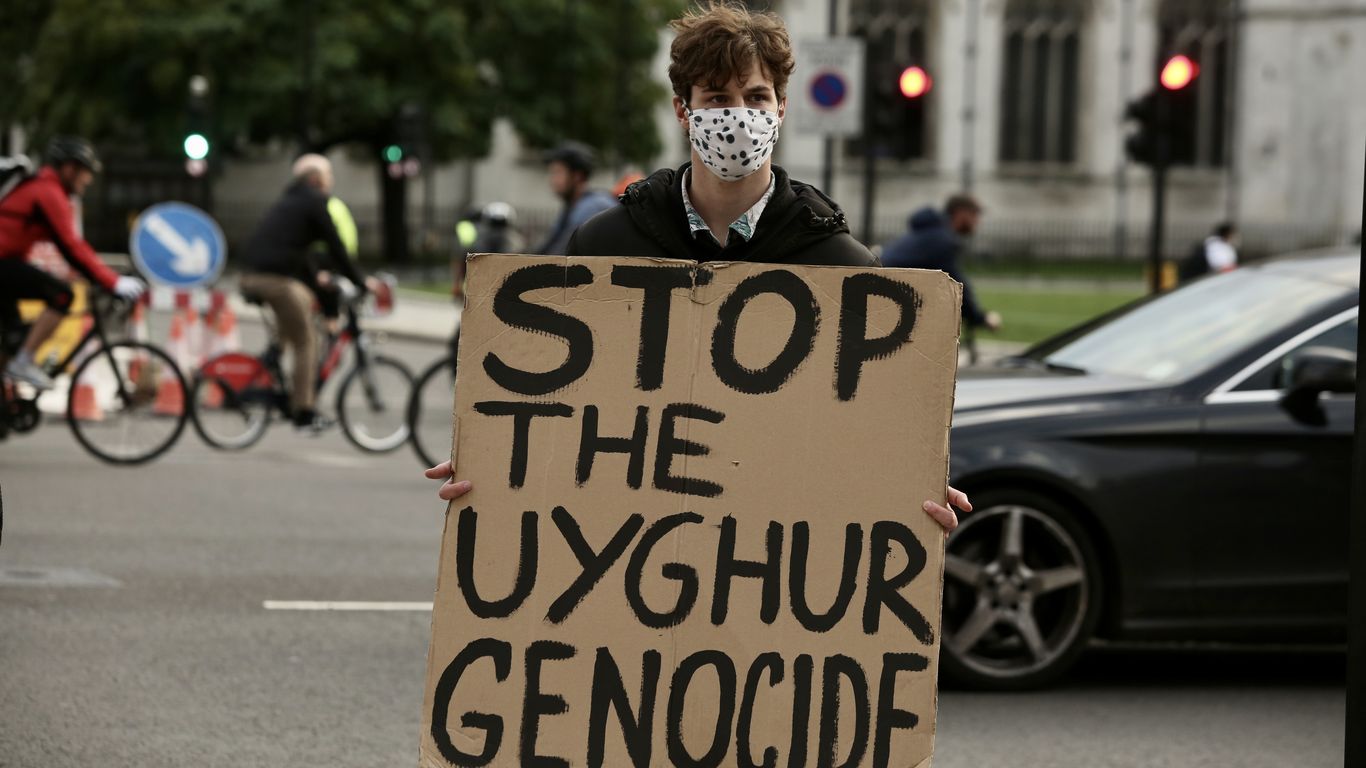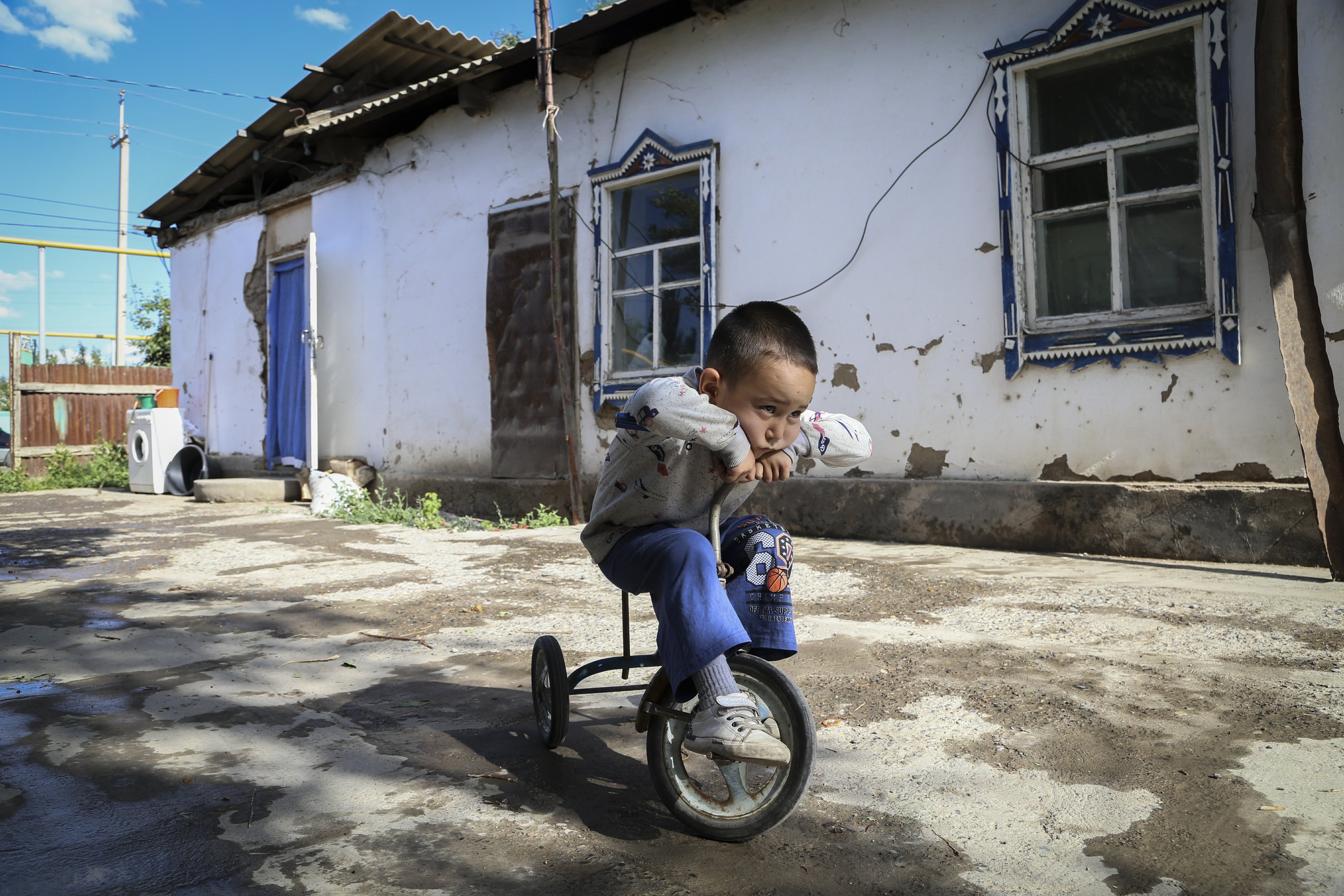
China cuts Uighur births with IUDs, abortion, sterilization
The Chinese government is taking draconian measures to slash birth rates among Uighurs and other minorities as part of a sweeping campaign to curb its Muslim population, even as it encourages some...
China cuts Uighur births with IUDs, abortion, sterilization
The Chinese government is taking draconian measures to slash birth rates among Uighurs and other minorities as part of a sweeping campaign to curb its Muslim population, even as it encourages some of the country’s Han majority to have more children.
While individual women have spoken out before about forced birth control, the practice is far more widespread and systematic than previously known, according to an AP investigation based on government statistics, state documents and interviews with 30 ex-detainees, family members and a former detention camp instructor. The campaign over the past four years in the far west region of Xinjiang is leading to what some experts are calling a form of “demographic genocide.”
The state regularly subjects minority women to pregnancy checks, and forces intrauterine devices, sterilization and even abortion on hundreds of thousands, the interviews and data show. Even while the use of IUDs and sterilization has fallen nationwide, it is rising sharply in Xinjiang.
The population control measures are backed by mass detention both as a threat and as a punishment for failure to comply. Having too many children is a major reason people are sent to detention camps, the AP found, with the parents of three or more ripped away from their families unless they can pay huge fines. Police raid homes, terrifying parents as they search for hidden children.
Gulnar Omirzakh and Zumret Dawut speak about their run-ins with Xinjiang's birth control campaign.
After Gulnar Omirzakh, a Chinese-born Kazakh, had her third child, the government ordered her to get an IUD inserted. Two years later, in January 2018, four officials in military camouflage came knocking at her door anyway. They gave Omirzakh, the penniless wife of a detained vegetable trader, three days to pay a $2,685 fine for having more than two children.
If she didn’t, they warned, she would join her husband and a million other ethnic minorities locked up in internment camps ¬— often for having too many children.
“God bequeaths children on you. To prevent people from having children is wrong,” said Omirzakh, who tears up even now thinking back to that day. “They want to destroy us as a people.”
The result of the birth control campaign is a climate of terror around having children, as seen in interview after interview. Birth rates in the mostly Uighur regions of Hotan and Kashgar plunged by more than 60% from 2015 to 2018, the latest year available in government statistics. Across the Xinjiang region, birth rates continue to plummet, falling nearly 24% last year alone — compared to just 4.2% nationwide, statistics show.
The hundreds of millions of dollars the government pours into birth control has transformed Xinjiang from one of China’s fastest-growing regions to among its slowest in just a few years, according to new research obtained by The Associated Press in advance of publication by China scholar Adrian Zenz.
“This kind of drop is unprecedented....there’s a ruthlessness to it,” said Zenz, a leading expert in the policing of China’s minority regions. “This is part of a wider control campaign to subjugate the Uighurs.”
U.S. Secretary of State Michael Pompeo denounced the policies in a statement Monday.
Full Coverage: China
“We call on the Chinese Communist Party to immediately end these horrific practices,” he said.
China’s foreign minister derided the story as “fabricated” and “fake news,” saying the government treats all ethnicities equally and protects the legal rights of minorities.
“Everyone, regardless of whether they’re an ethnic minority or Han Chinese, must follow and act in accordance with the law,” ministry spokesman Zhao Lijian said Monday when asked about the AP story.
Chinese officials have said in the past that the new measures are merely meant to be fair, allowing both Han Chinese and ethnic minorities the same number of children.
For decades, China had one of the most extensive systems of minority entitlements in the world, with Uighurs and others getting more points on college entrance exams, hiring quotas for government posts and laxer birth control restrictions. Under China’s now-abandoned ‘one child’ policy, the authorities had long encouraged, often forced, contraceptives, sterilization and abortion on Han Chinese. But minorities were allowed two children — three if they came from the countryside.
Under President Xi Jinping, China’s most authoritarian leader in decades, those benefits are now being rolled back. In 2014, soon after Xi visited Xinjiang, the region’s top official said it was time to implement “equal family planning policies” for all ethnicities and “reduce and stabilize birth rates.” In the following years, the government declared that instead of just one child, Han Chinese could now have two, and three in Xinjiang’s rural areas, just like minorities.
But while equal on paper, in practice Han Chinese are largely spared the abortions, sterilizations, IUD insertions and detentions for having too many children that are forced on Xinjiang’s other ethnicities, interviews and data show. Some rural Muslims, like Omirzakh, are punished even for having the three children allowed by the law.
State-backed scholars have warned for years that large rural religious families were at the root of bombings, knifings and other attacks the Xinjiang government blamed on Islamic terrorists. The growing Muslim population was a breeding ground for poverty and extremism which could “heighten political risk,” according to a 2017 paper by the head of the Institute of Sociology at the Xinjiang Academy of Social Sciences. Another cited as a key obstacle the religious belief that “the fetus is a gift from God.”
Outside experts say the birth control campaign is part of a state-orchestrated assault on the Uighurs to purge them of their faith and identity and forcibly assimilate them. They’re subjected to political and religious re-education in camps and forced labor in factories, while their children are indoctrinated in orphanages. Uighurs, who are often but not always Muslim, are also tracked by a vast digital surveillance apparatus.
“The intention may not be to fully eliminate the Uighur population, but it will sharply diminish their vitality,” said Darren Byler, an expert on Uighurs at the University of Colorado. “It will make them easier to assimilate into the mainstream Chinese population.”
Some go a step further.
“It’s genocide, full stop. It’s not immediate, shocking, mass-killing on the spot type genocide, but it’s slow, painful, creeping genocide,” said Joanne Smith Finley, who works at Newcastle University in the U.K. “These are direct means of genetically reducing the Uighur population.”
For centuries, the majority was Muslim in the arid, landlocked region China now calls “Xinjiang” — meaning “New Frontier” in Mandarin.
After the People’s Liberation Army swept through in 1949, China’s new Communist rulers ordered thousands of soldiers to settle in Xinjiang, pushing the Han population from 6.7% that year to more than 40% by 1980. The move sowed anxiety about Chinese migration that persists to this day. Drastic efforts to restrict birth rates in the 1990s were relaxed after major pushback, with many parents paying bribes or registering children as the offspring of friends or other family members.
That all changed with an unprecedented crackdown starting in 2017, throwing hundreds of thousands of people into prisons and camps for alleged “signs of religious extremism” such as traveling abroad, praying or using foreign social media. Authorities launched what several notices called “dragnet-style” investigations to root out parents with too many children, even those who gave birth decades ago.
“Leave no blind spots,” said two county and township directives in 2018 and 2019 uncovered by Zenz, who is also an independent contractor with the Victims of Communism Memorial Foundation, a bipartisan nonprofit based in Washington, D.C. “Contain illegal births and lower fertility levels,” said a third.
Officials and armed police began pounding on doors, looking for kids and pregnant women. Minority residents were ordered to attend weekly flag-raising ceremonies, where officials threatened detention if they didn’t register all their children, according to interviews backed by attendance slips and booklets. Notices found by the AP show that local governments set up or expanded systems to reward those who report illegal births.
In some areas, women were ordered to take gynecology exams after the ceremonies, they said. In others, officials outfitted special rooms with ultrasound scanners for pregnancy tests.
“Test all who need to be tested,” ordered a township directive from 2018. “Detect and deal with those who violate policies early.”
Abdushukur Umar was among the first to fall victim to the crackdown on children. A jovial Uighur tractor driver-turned-fruit merchant, the proud father considered his seven children a blessing from God.
But authorities began pursuing him in 2016. The following year, he was thrown into a camp and later sentenced to seven years in prison — one for each child, authorities told relatives.
“My cousin spent all his time taking care of his family, he never took part in any political movements,” Zuhra Sultan, Umar’s cousin, said from exile in Turkey. “How can you get seven years in prison for having too many children? We’re living in the 21st century — this is unimaginable.”
Sixteen Uighurs and Kazakhs told the AP they knew people interned or jailed for having too many children. Many received years, even decades in prison.
Leaked data obtained and corroborated by the AP showed that of 484 camp detainees listed in Karakax county in Xinjiang, 149 were there for having too many children - the most common reason for holding them. Time in a camp — what the government calls “education and training” — for parents with too many children is written policy in at least three counties, notices found by Zenz confirmed.
In 2017, the Xinjiang government also tripled the already hefty fines for violating family planning laws for even the poorest residents — to at least three times the annual disposable income of the county. While fines also apply to Han Chinese, only minorities are sent to the detention camps if they cannot pay, according to interviews and data. Government reports show the counties collect millions of dollars from the fines each year.
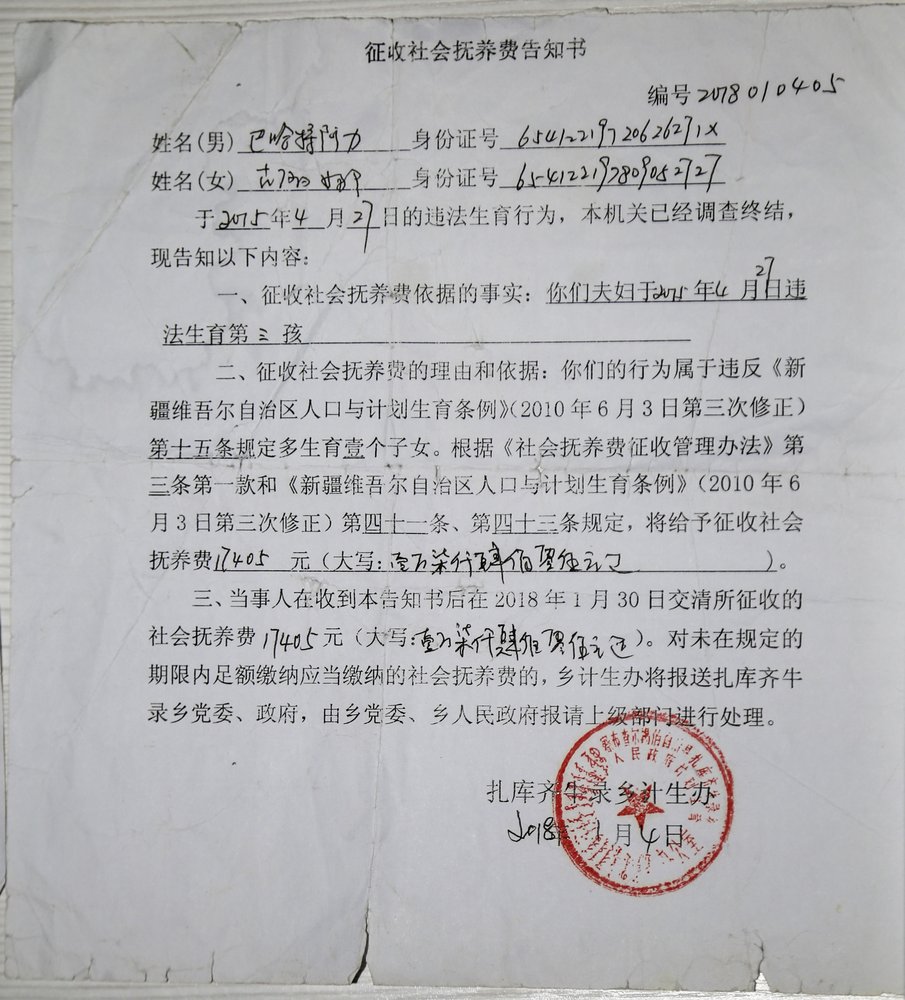
Gulnar Omirzakh's fine for 17,405 RMB, or $2865, for having a third child.
In other efforts to change the population balance of Xinjiang, China is dangling land, jobs and economic subsidies to lure Han migrants there. It is also aggressively promoting intermarriage between Han Chinese and Uighurs, with one couple telling the AP they were given money for housing and amenities like a washing machine, refrigerator and TV.
“It links back to China’s long history of dabbling in eugenics….you don’t want people who are poorly educated, marginal minorities breeding quickly,” said James Leibold, a specialist in Chinese ethnic policy at La Trobe in Melbourne. “What you want is your educated Han to increase their birth rate.”
Sultan describes how the policy looks to Uighurs like her: “The Chinese government wants to control the Uighur population and make us fewer and fewer, until we disappear.”
___
Once in the detention camps, women are subjected to forced IUDs and what appear to be pregnancy prevention shots, according to former detainees. They are also made to attend lectures on how many children they should have.
Seven former detainees told the AP that they were force-fed birth control pills or injected with fluids, often with no explanation. Many felt dizzy, tired or ill, and women stopped getting their periods. After being released and leaving China, some went to get medical check-ups and found they were sterile.
It’s unclear what former detainees were injected with, but Xinjiang hospital slides obtained by the AP show that pregnancy prevention injections, sometimes with the hormonal medication Depo-Provera, are a common family planning measure. Side effects can include headaches and dizziness.
Dina Nurdybay, a Kazakh woman, was detained in a camp which separated married and unmarried women. The married women were given pregnancy tests, Nurdybay recalled, and forced to have IUDs installed if they had children. She was spared because she was unmarried and childless.
One day in February 2018, one of her cellmates, a Uighur woman, had to give a speech confessing what guards called her “crimes.” When a visiting official peered through the iron bars of their cell, she recited her lines in halting Mandarin.
“I gave birth to too many children,” she said. “It shows I’m uneducated and know little about the law.”
“Do you think it’s fair that Han people are only allowed to have one child?” the official asked, according to Nurdybay. “You ethnic minorities are shameless, wild and uncivilized.”
Nurdybay met at least two others in the camps whom she learned were locked up for having too many children. Later, she was transferred to another facility with an orphanage that housed hundreds of children, including those with parents detained for giving birth too many times. The children counted the days until they could see their parents on rare visits.
“They told me they wanted to hug their parents, but they were not allowed,” she said. “They always looked very sad.”
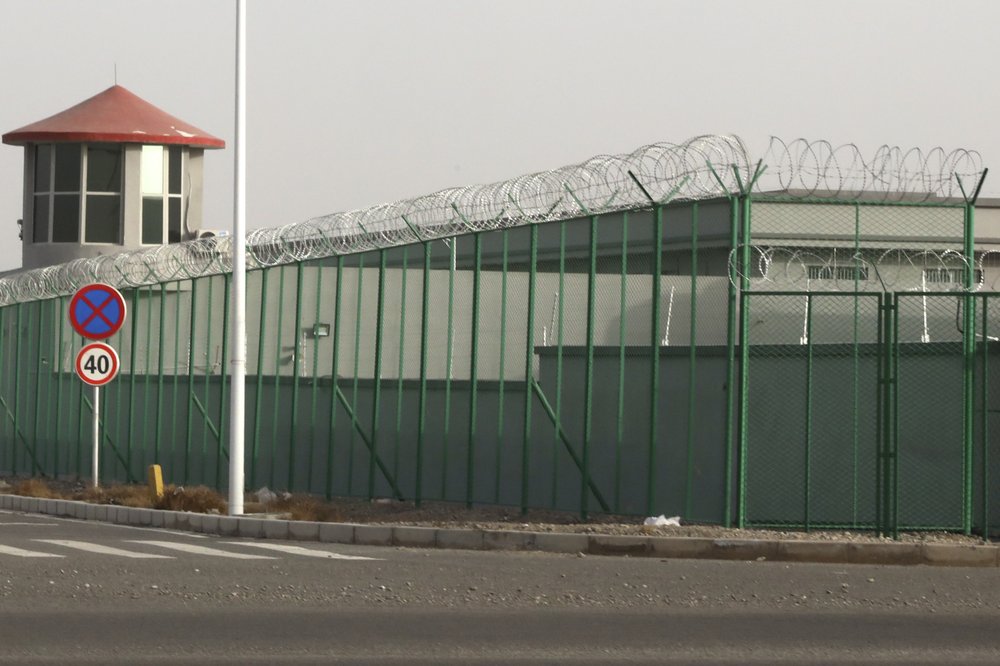
One of Xinjiang's internment camps in Artux, China.
Another former detainee, Tursunay Ziyawudun, said she was injected until she stopped having her period, and kicked repeatedly in the lower stomach during interrogations. She now can’t have children and often doubles over in pain, bleeding from her womb, she said.
Ziyawudun and the 40 other women in her “class” were forced to attend family planning lectures most Wednesdays, where films were screened about impoverished women struggling to feed many children. Married women were rewarded for good behavior with conjugal visits from their husbands, along with showers, towels, and two hours in a bedroom. But there was a catch – they had to take birth control pills beforehand.
Some women have even reported forced abortions. Ziyawudun said a “teacher” at her camp told women they would face abortions if found pregnant during gynecology exams.
A woman in another class turned out to be pregnant and disappeared from the camp, she said. She added that two of her cousins who were pregnant got rid of their children on their own because they were so afraid.
Another woman, Gulbahar Jelilova, confirmed that detainees in her camp were forced to abort their children. She also saw a new mother, still leaking breast milk, who did not know what had happened to her infant. And she met doctors and medical students who were detained for helping Uighurs dodge the system and give birth at home.
In December 2017, on a visit from Kazakhstan back to China, Gulzia Mogdin was taken to a hospital after police found WhatsApp on her phone. A urine sample revealed she was two months pregnant with her third child. Officials told Mogdin she needed to get an abortion and threatened to detain her brother if she didn’t.
During the procedure, medics inserted an electric vacuum into her womb and sucked her fetus out of her body. She was taken home and told to rest, as they planned to take her to a camp.
Months later, Mogdin made it back to Kazakhstan, where her husband lives.
“That baby was going to be the only baby we had together,” said Mogdin, who had recently remarried. “I cannot sleep. It’s terribly unfair.”
The success of China’s push to control births among Muslim minorities shows up in the numbers for IUDs and sterilization.
In 2014, just over 200,000 IUDs were inserted in Xinjiang. By 2018, that jumped more than 60 percent to nearly 330,000 IUDs. At the same time, IUD use tumbled elsewhere in China, as many women began getting the devices removed.
A former teacher drafted to work as an instructor at a detention camp described her experience with IUDs to the AP.
She said it started with flag-raising assemblies at her compound in the beginning of 2017, where officials made Uighur residents recite “anti-terror” lessons. They chanted, “If we have too many children, we’re religious extremists....That means we have to go to the training centers.”
Police rounded up over 180 parents with too many children until “not a single one was left,” she said. At night, she said, she lay in bed, stiff with terror, as officers with guns and tasers hauled her neighbors away. From time to time police pounded on her door and searched her apartment for Qurans, knives, prayer mats and of course children, she said.
“Your heart would leap out of your chest,” she said.
Then, that August, officials in the teacher’s compound were told to install IUDs on all women of childbearing age. She protested, saying she was nearly 50 with just one child and no plans to have more. Officials threatened to drag her to a police station and strap her to an iron chair for interrogation.
She was forced into a bus with four armed officers and taken to a hospital where hundreds of Uighur women lined up in silence, waiting for IUDs to be inserted. Some wept quietly, but nobody dared say a word because of the surveillance cameras hanging overhead.
Her IUD was designed to be irremovable without special instruments. The first 15 days, she got headaches and nonstop menstrual bleeding.
“I couldn’t eat properly, I couldn’t sleep properly. It gave me huge psychological pressure,” she said. “Only Uighurs had to wear it.”
Chinese health statistics also show a sterilization boom in Xinjiang.
Budget documents obtained by Zenz show that starting in 2016, the Xinjiang government began pumping tens of millions of dollars into a birth control surgery program and cash incentives for women to get sterilized. While sterilization rates plunged in the rest of the country, they surged seven-fold in Xinjiang from 2016 to 2018, to more than 60,000 procedures. The Uighur-majority city of Hotan budgeted for 14,872 sterilizations in 2019 — over 34% of all married women of childbearing age, Zenz found.
Even within Xinjiang, policies vary widely, being harsher in the heavily Uighur south than the Han-majority north. In Shihezi, a Han-dominated city where Uighurs make up less than 2% of the population, the government subsidizes baby formula and hospital birth services to encourage more children, state media reported.
Zumret Dawut got no such benefits. In 2018, the mother of three was locked in a camp for two months for having an American visa.
When she returned home under house arrest, officials forced her to get gynecology exams every month, along with all other Uighur women in her compound. Han women were exempted. They warned that if she didn’t take what they called “free examinations”, she could end up back in the camp.
One day, they turned up with a list of at least 200 Uighur women in her compound with more than two children who had to get sterilized, Dawut recalled.
“My Han Chinese neighbors, they sympathized with us Uighurs,” Dawut said. “They told me, ‘oh, you’re suffering terribly, the government is going way too far!’”
Dawut protested, but police again threatened to send her back to the camp. During the sterilization procedure, Han Chinese doctors injected her with anesthesia and tied her fallopian tubes — a permanent operation. When Dawut came to, she felt her womb ache.
“I was so angry,” she said. “I wanted another son.”
___
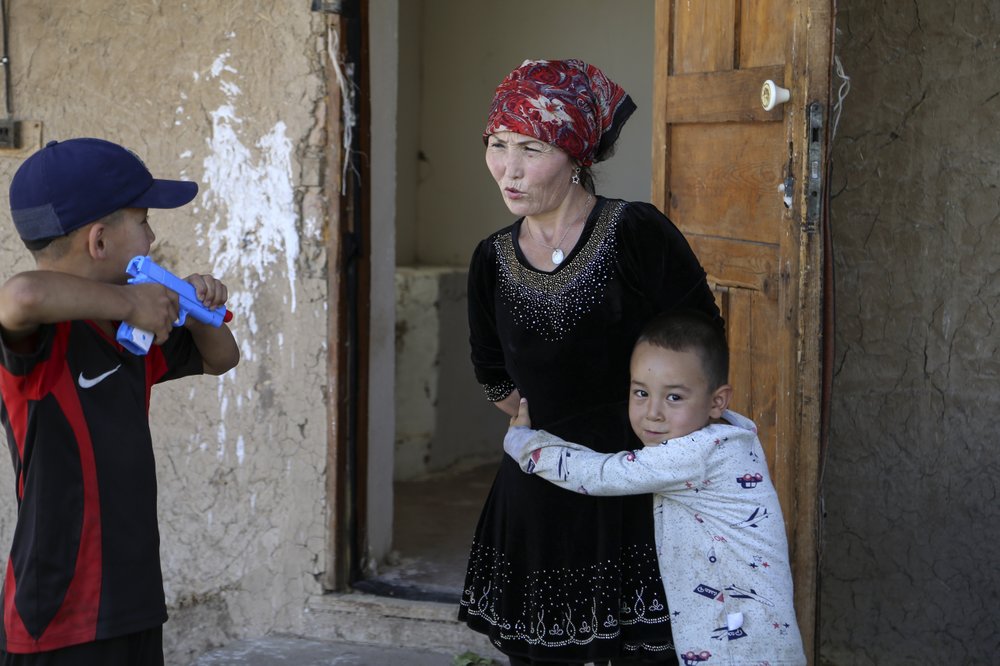
Gulnar Omirzakh and her third child, Alif Baqytali.
Looking back, Omirzakh considers herself lucky.
After that frigid day when officials threatened to lock her up, Omirzakh called relatives around the clock. Hours before the deadline, she scraped together enough money to pay the fine from the sale of her sister’s cow and high-interest loans, leaving her deep in debt.
For the next year, Omirzakh attended classes with the wives of others detained for having too many children. She and her children lived with two local party officials sent specially to spy on them. When her husband was finally released, they fled for Kazakhstan with just a few bundles of blankets and clothes.
The IUD still in Omirzakh’s womb has now sunk into her flesh, causing inflammation and piercing back pain, “like being stabbed with a knife.” For Omirzakh, it’s a bitter reminder of everything she’s lost — and the plight of those she left behind.
“People there are now terrified of giving birth,” she said. “When I think of the word ‘Xinjiang,’ I can still feel that fear.”

